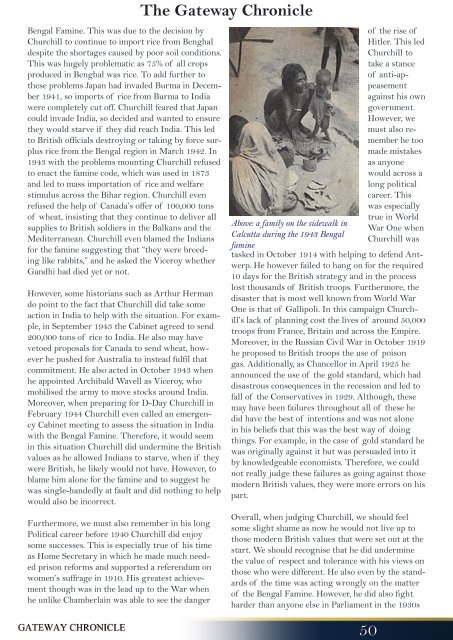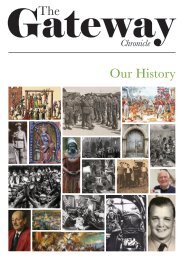You also want an ePaper? Increase the reach of your titles
YUMPU automatically turns print PDFs into web optimized ePapers that Google loves.
Bengal Famine. This was due to the decision by<br />
Churchill to continue to import rice from Benghal<br />
despite the shortages caused by poor soil conditions.<br />
This was hugely problematic as 75% of all crops<br />
produced in Benghal was rice. To add further to<br />
these problems Japan had invaded Burma in December<br />
1941, so imports of rice from Burma to India<br />
were completely cut off. Churchill feared that Japan<br />
could invade India, so decided and wanted to ensure<br />
they would starve if they did reach India. This led<br />
to British officials destroying or taking by force surplus<br />
rice from the Bengal region in March 1942. In<br />
1943 with the problems mounting Churchill refused<br />
to enact the famine code, which was used in 1873<br />
and led to mass importation of rice and welfare<br />
stimulus across the Bihar region. Churchill even<br />
refused the help of Canada’s offer of 100,000 tons<br />
of wheat, insisting that they continue to deliver all<br />
supplies to British soldiers in the Balkans and the<br />
Mediterranean. Churchill even blamed the Indians<br />
for the famine suggesting that “they were breeding<br />
like rabbits,” and he asked the Viceroy whether<br />
Gandhi had died yet or not.<br />
However, some historians such as Arthur Herman<br />
do point to the fact that Churchill did take some<br />
action in India to help with the situation. For example,<br />
in September 1943 the Cabinet agreed to send<br />
200,000 tons of rice to India. He also may have<br />
vetoed proposals for Canada to send wheat, however<br />
he pushed for Australia to instead fulfil that<br />
commitment. He also acted in October 1943 when<br />
he appointed Archibald Wavell as Viceroy, who<br />
mobilised the army to move stocks around India.<br />
Moreover, when preparing for D-Day Churchill in<br />
February 1944 Churchill even called an emergency<br />
Cabinet meeting to assess the situation in India<br />
with the Bengal Famine. Therefore, it would seem<br />
in this situation Churchill did undermine the British<br />
values as he allowed Indians to starve, when if they<br />
were British, he likely would not have. However, to<br />
blame him alone for the famine and to suggest he<br />
was single-handedly at fault and did nothing to help<br />
would also be incorrect.<br />
Furthermore, we must also remember in his long<br />
Political career before 1940 Churchill did enjoy<br />
some successes. This is especially true of his time<br />
as Home Secretary in which he made much needed<br />
prison reforms and supported a referendum on<br />
women’s suffrage in 1910. His greatest achievement<br />
though was in the lead up to the War when<br />
he unlike Chamberlain was able to see the danger<br />
The <strong>Gateway</strong> <strong>Chronicle</strong><br />
Above: a family on the sidewalk in<br />
Calcutta during the 1943 Bengal<br />
famine<br />
of the rise of<br />
Hitler. This led<br />
Churchill to<br />
take a stance<br />
of anti-appeasement<br />
against his own<br />
government.<br />
However, we<br />
must also remember<br />
he too<br />
made mistakes<br />
as anyone<br />
would across a<br />
long political<br />
career. This<br />
was especially<br />
true in World<br />
War One when<br />
Churchill was<br />
tasked in October 1914 with helping to defend Antwerp.<br />
He however failed to hang on for the required<br />
10 days for the British strategy and in the process<br />
lost thousands of British troops. Furthermore, the<br />
disaster that is most well known from World War<br />
One is that of Gallipoli. In this campaign Churchill’s<br />
lack of planning cost the lives of around 50,000<br />
troops from France, Britain and across the Empire.<br />
Moreover, in the Russian Civil War in October 1919<br />
he proposed to British troops the use of poison<br />
gas. Additionally, as Chancellor in April 1925 he<br />
announced the use of the gold standard, which had<br />
disastrous consequences in the recession and led to<br />
fall of the Conservatives in 1929. Although, these<br />
may have been failures throughout all of these he<br />
did have the best of intentions and was not alone<br />
in his beliefs that this was the best way of doing<br />
things. For example, in the case of gold standard he<br />
was originally against it but was persuaded into it<br />
by knowledgeable economists. Therefore, we could<br />
not really judge these failures as going against those<br />
modern British values, they were more errors on his<br />
part.<br />
Overall, when judging Churchill, we should feel<br />
some slight shame as now he would not live up to<br />
those modern British values that were set out at the<br />
start. We should recognise that he did undermine<br />
the value of respect and tolerance with his views on<br />
those who were different. He also even by the standards<br />
of the time was acting wrongly on the matter<br />
of the Bengal Famine. However, he did also fight<br />
harder than anyone else in Parliament in the 1930s<br />
50


















